Cartographer accosted in a shopping center amid allegations he conspired to cede part of a monastery to Azerbaijan
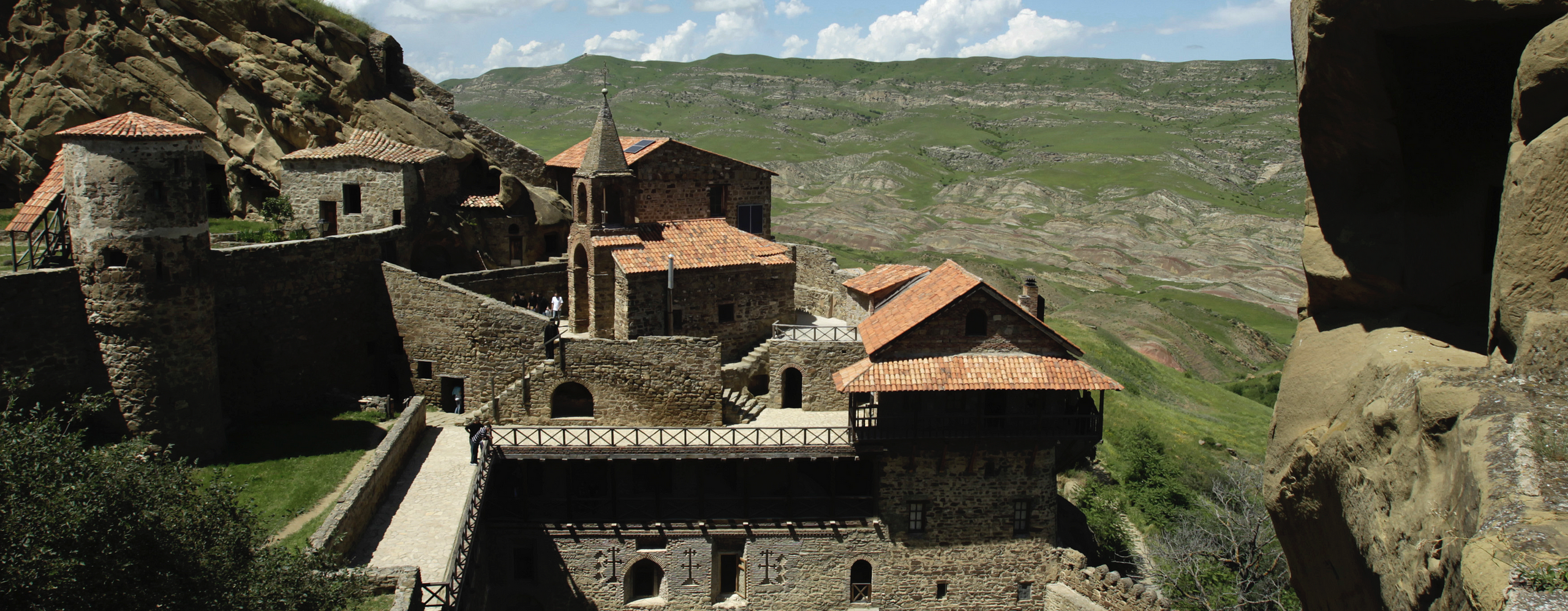
In October 2020, three weeks before the 2020 parliamentary elections in Georgia and soon after erupting armed conflict between Armenia and Azerbaijan over Nagorno-Karabakh, Georgia’s Prosecutor’s Office detained Iveri Melashvili and Natalia Ilychova, two cartographers of the Delimitation and Demarcation Commission, accusing them of attempting to cede land to Azerbaijan.
Melashvili and Ilychova were arrested based on a request from Georgian Defense Minister Irakli Gharibashvili. The move fueled a new wave of tensions around the historical David Gareji monastery complex along the Georgia-Azerbaijan border, which both countries claim as their own territory. It was also accompanied by a public campaign spearheaded by Georgia’s ruling party, far-right groups, clergy, and other actors targeting the two civil servants at the center of the case — particularly Melashvili — fueling vitriol against them online and offline.
Background
The David Gareji monastery complex, which comprises 17 medieval Georgian Orthodox monasteries, is a site of great religious and cultural significance for Georgia. Azerbaijan also has a historical claim to the territory, as the complex straddles the unofficial border between the two countries that runs along a ridge of mountains in the border region. During the Soviet era, at the initiative of Joseph Stalin, part of the monastery complex was transferred to Azerbaijan. After the collapse of the Soviet Union, all socialist republics declared their independence in accordance with borders as they existed in 1991. As Georgia and Azerbaijan began discussing border demarcation, control over the David Gareji complex emerged as a point of dispute. Thirteen out of the 17 monasteries lie on Georgian-controlled territory, and two sites in particular — the Chichkhituri and Udabno monasteries — have been the main subject of negotiations with Azerbaijan. One monastery is also located deeper within Azerbaijani territory, complicating the negotiations.
A third of the Georgia-Azerbaijan border has yet to be delimited, including parts of the complex, making it a sensitive topic in Georgia that is ripe for manipulation.
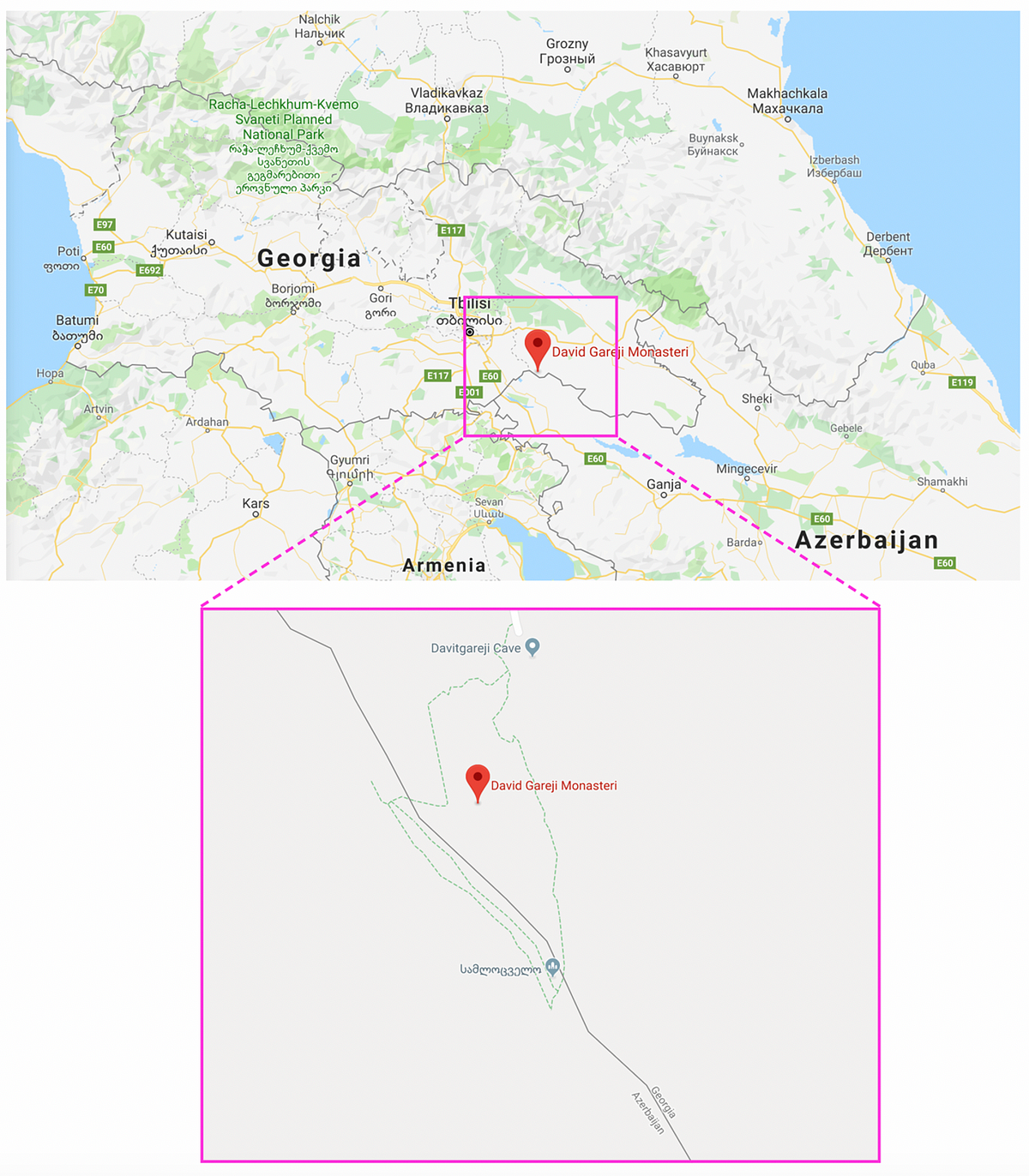
The current case
In the latest incident responsible for the re-flaring of tensions over claims to the monastery complex, the Georgian Prosecutor’s Office accused two cartographers of concealing an original 1:200,000 scale map and using a smaller-scale 1:500,000 map in the negotiations with Azerbaijan, allegedly resulting in the loss of 35 kilometers of Georgian land. The defense side of the case denied the accusations, claiming the delimitation commission had been aware of the existence of the 1:200,000 map since 1999 but did not used it because it contained major errors and discrepancies. In contrast, the 1:500,000 map had been ratified by the Supreme Councils of Soviet Republic of Georgia, Azerbaijan, and Armenia in 1939 and served as a basis for the future demarcation and delimitation process. In an interview with media outlet On.ge, Melashvili explained that the 1:500,000 map had been agreed upon by both sides for the negotiation process, and compared the use of the 1:200,000 scale map to bringing fabricated banknotes into the bank.
On January 28, 2021, the court released each of the cartographers on bail for 20,000 GEL (USD $6,060). In a show of solidarity, the Shame Movement, a group of young Georgian activists, was able to collect the bail amount within two hours. The two still face 10 to 15 years of prison, however, since they are charged with “actions directed at the violation of the territorial integrity of the country.”
The detention of the cartographers was accompanied by a negative messaging campaign promoted by the Georgian government officials, Georgia’s Orthodox Church, and pro-Kremlin and ultra-nationalist actors. Defense Minister Irakli Gharibashvili and Georgian Orthodox Church spokesperson Andria Jaghmaidze labeled the case “treason” and accused the cartographers of ceding lands to Azerbaijan against Georgia’s interests. This was followed by a campaign in pro-government media and social networks. Ahead of the elections, Imedi TV, a Georgian Dream-affiliated TV channel, placed a banner with the slogan “Gareji is Georgia” across its programs. The same slogan, together with a hashtag meaning “Azerbaijan is the Enemy,” was promoted alongside sponsored ads from ultranationalist pages and Georgian-Dream affiliated media outlets on Facebook.
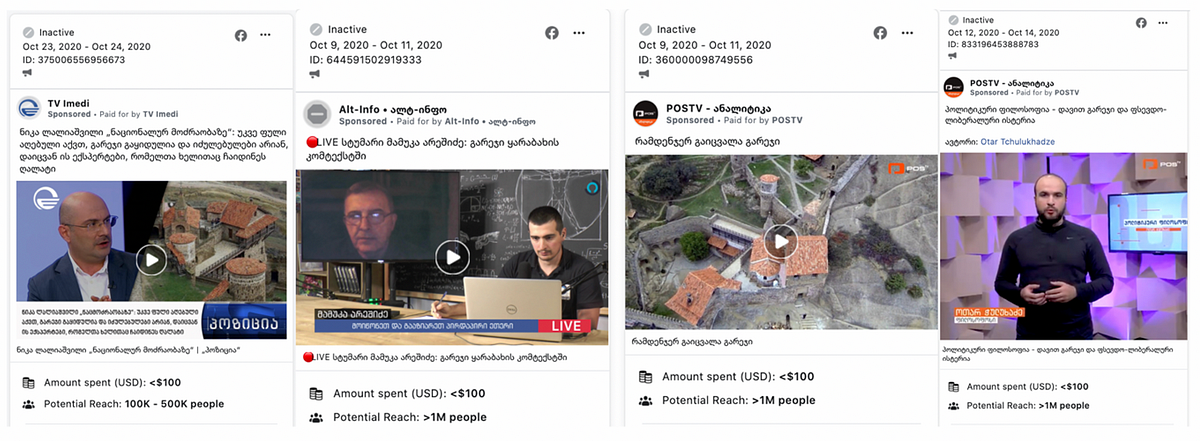
The timing of the accusation and other inconsistencies in the case has raised concerns among Georgian civil society groups and the political opposition, who have assessed the investigation as politically motivated and intended to consolidate power around Georgian Dream. Family members of detainees and democracy activists have held several demonstrations demanding the release of the cartographers.
First, the Prosecutor Office’s accusation against the cartographers does not actually relate to their dealings in the David Gareji monastery complex negotiations, but to the cartographers’ work in 2006–2007 on another part of the border with Azerbaijan that has since been demarcated. However, the campaign underway falsely linked the accusations to the David Gareji complex, a more emotionally fraught topic in Georgia.
Second, the sudden reappearance of the “lost” 1:200,000 scale map reportedly has connections to Russia. A Georgian businessman, Davit Khidasheli, who is the former executive vice-president of AFK Sistema PAO, one of the largest investment companies in Russia, said in an interview with Rustavi 2 that the leader of the Georgian Dream party oligarch Bidzina Ivanishvili personally asked him to locate the 1:200,000 scale maps. In the same interview, Khidasheli said that he was able to obtain parts of the maps from Russian state archives and asked the experts of the Russian Federal Agency Roskartographiya to analyze and compare the maps. According to media reports, Khidasheli obtained the maps with the help of Russian foreign intelligence officer Oleg Mubarashkin, who also worked as Sistema’s vice president and later was appointed managing partner. This raised concerns in Georgian civil society of possible Russian interference in the case.
Accusations of conspiring to cede part of the David Gareji monastery complex to Azerbaijan have long been on the agenda of pro-Kremlin and ultra-nationalist actors. Alliance of Patriots, a pro-Kremlin political party with six seats in the previous parliament, has been demanding the punishment of members of the delimitation commission since 2019. Georgian March and Georgian Idea, two ultra-nationalist parties with strong links to pro-Kremlin actors, have organized several demonstrations in the David Gareji complex with the slogan “Davit-Gareji is Georgia.”
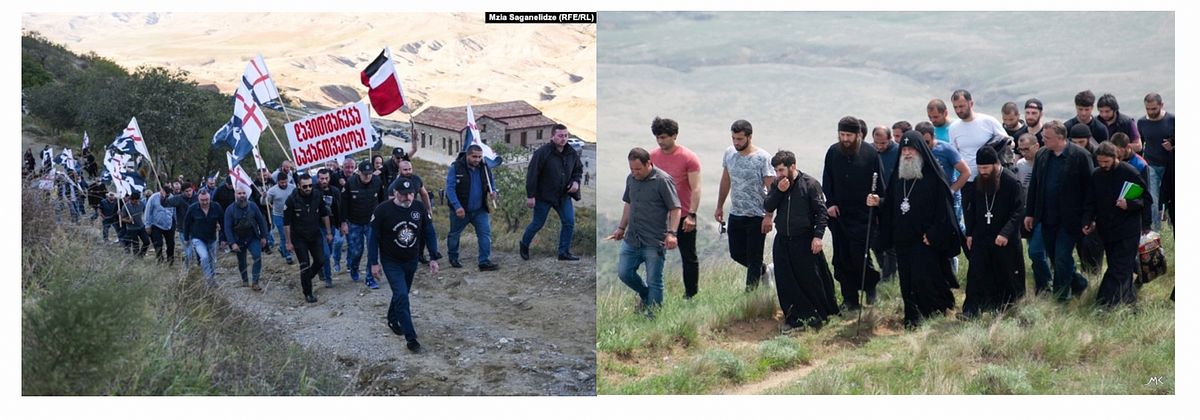
“Enemy of the state” and mobilization of public opinion
After his release, Iveri Melashvili, one of the detained cartographers, gave interviews to several online media outlets and TV channels over the David Gareji case. This series of interviews sparked an attempt to discredit him by using his own words against him.
On January 28, Melashvili discussed the process of defining the disputed section of the border in a talk show on TV Pirveli. A portion of his interview, namely the quote “how does it [part of David Gareji that is controlled by Azerbaijan] belong to you when it does not belong to you?” was taken out of context and started to circulate on media and social media. In fact, Melashvili’s statement did not focus on the historical ownership of the complex, but on the delimitation of the part of the monastery currently under dispute. Specifically, he was expressing concern that the fuss kicked up by the clergy and related actors in Georgia had been counterproductive to the negotiations.
Myth Detector, a local fact-checking and watchdog project, collected the sources and actors engaged in the campaign against Melashvili. According to their reporting, ultranationalist and pro-government groups, together with clergy, were the first to share Melashvili’s words out of context. Myth Detector also traced the IP addresses of suspicious websites spreading rumors about Melashvili’s private life to Russia.

Elene Khoshtaria, a former member of Parliament for the opposition party European Georgia, published 100 screengrabs of Facebook posts by the public servants who shared identical messages and comments accusing Melashvili of treason. It appeared that a closed Facebook group of Georgian Dream activists served as a mobilization point for the campaign. In one of the screengrabs obtained by Khoshtaria, Georgian Dream activists called on other supporters to share “simple” messages against Melashvili, alleging that he is traitor and the enemy of the state.
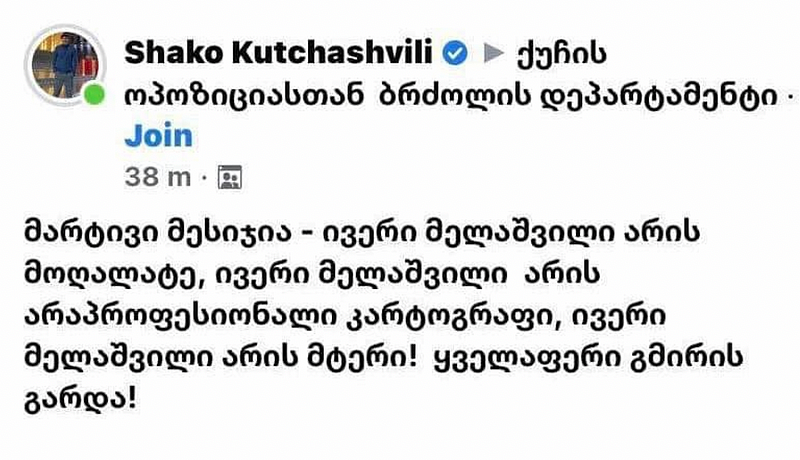
Georgian public officials backed and supported the smear campaign. The selected cut from Melashvili’s interview was echoed by President Salome Zurabishvili, Tea Tsulukiani, a Georgian Dream MP and the former Justice Ministe. Mikheil Sarjveladze, another Georgian Dream MP, accused Melashvili of declaring the monastery Azerbaijani territory.
The CrowdTangle search result of the last name “Melashvili” in Georgian for a month period from January 7 to February 7, 2021 shows that mentions started to increase in the mid-January and reached its peak on January 31.
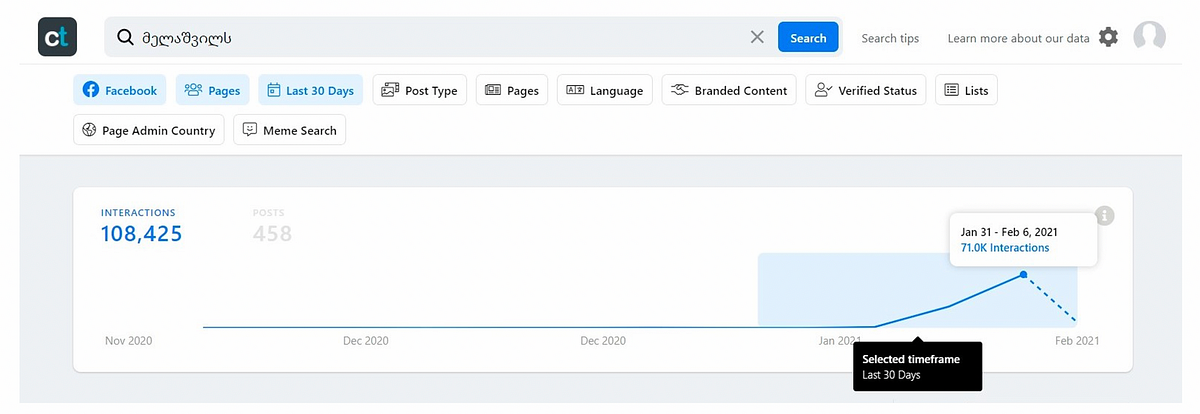
Confronted in a shopping center
On February 1, after a period of sustained interest to the case on social media, Melashvili was confronted in a shopping center by a young man.
In a video of the incident on February 1 posted by a Georgian Facebook user, the young man calls Melashvili a traitor and accuses him of ceding land to Azerbaijan. In addition, he calls on people to do the same when they come across Melashvili outside.
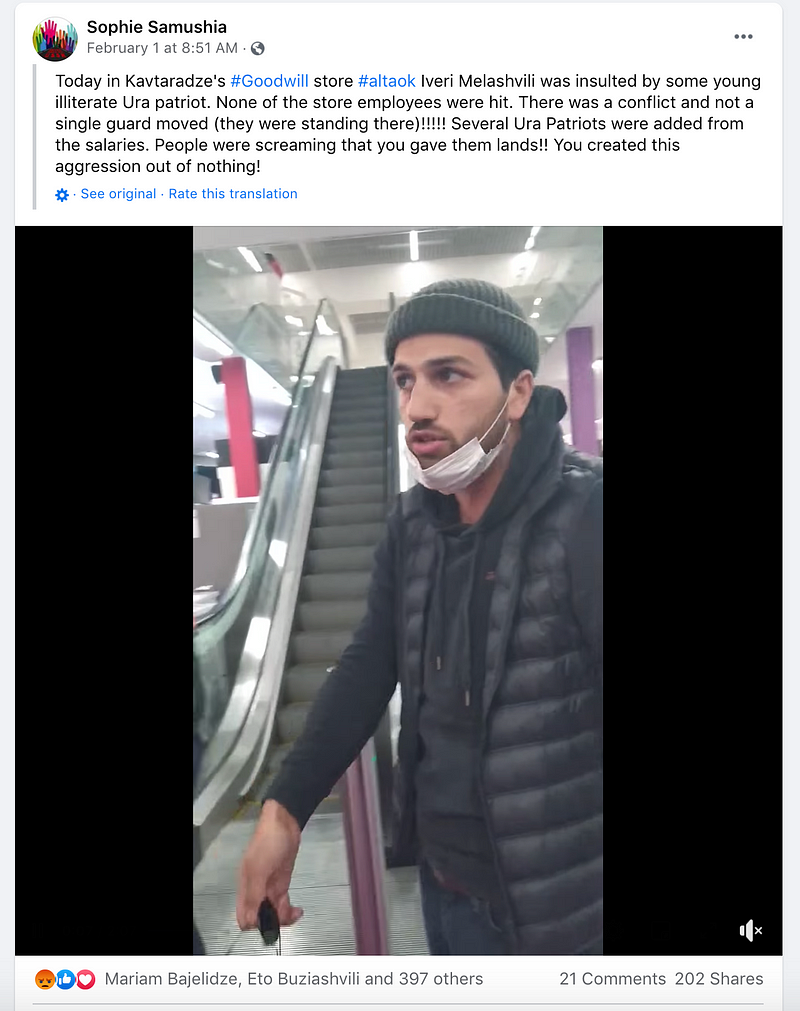
The initial video footage quickly went viral in Georgia, prompting outrage. The footage garnered more than 35,000 views and 200 shares. Mainstream Georgian TV channels Formula and Mtavari reported on the incident, but the footage was also used by a number of Facebook pages and groups to further demonize and fuel negative sentiment toward Melashvili.
Some of the Facebook pages spread the video on their timelines with captions endorsing the action of the young man verbally attacking Melashvili.
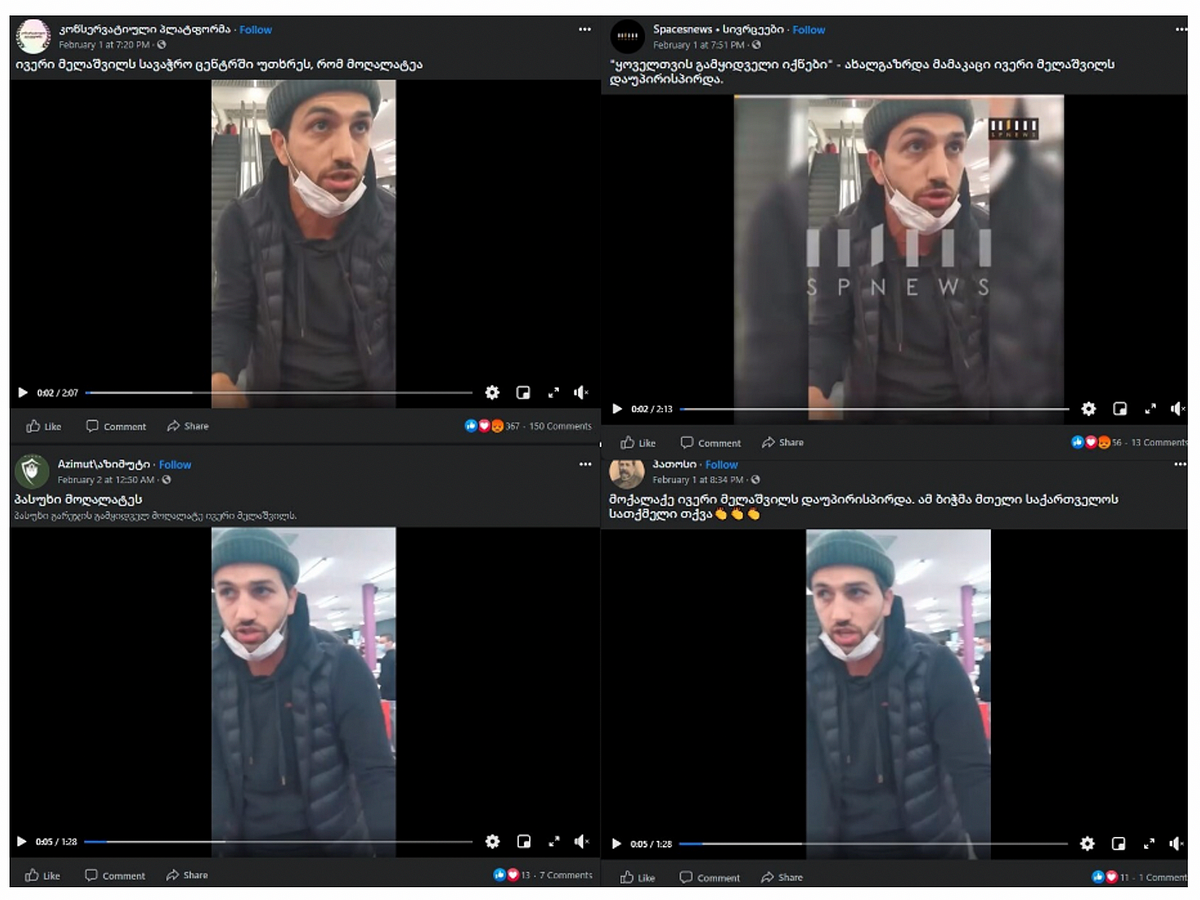
The video was also spread in Facebook groups supporting the ruling Georgian Dream party. In the group კახა კალაძე თბილისის მერი (“Kakha Kaladze mayor of Tbilisi”), which has more than 44,000 members, users urged each other to attack the “traitor” Melashvili the same way the young man — “a hero of the day” — did.
In another group of Georgian Dream supporters, ნამდვილების კლანი / ქართული ოცნება (“the clan of real ones/Georgian Dream”), with 3,600 members, users also supported the attacker, commenting that Melashvili deserved it and that he should not dare leave his house.
Across these groups, the video footage garnered hundreds of reactions and around 160 comments. The comments sections of these posts were full of swearing and threats directed at Melashvili. Facebook users encouraged each other to follow the example of the man insulting Melashvili if they came across the cartographer.
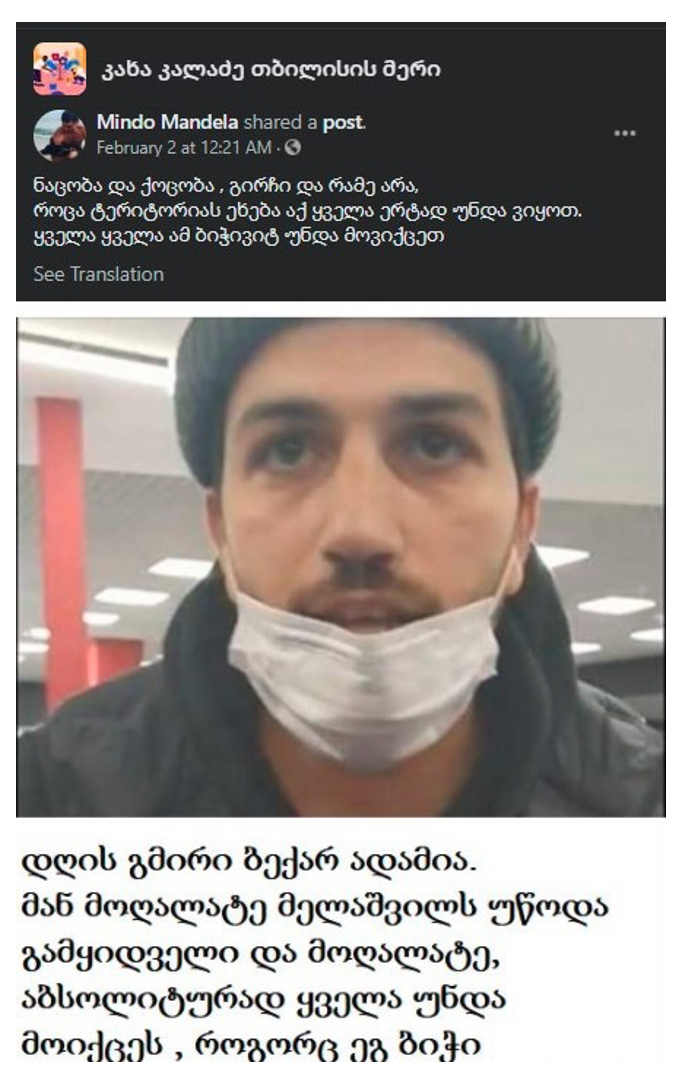
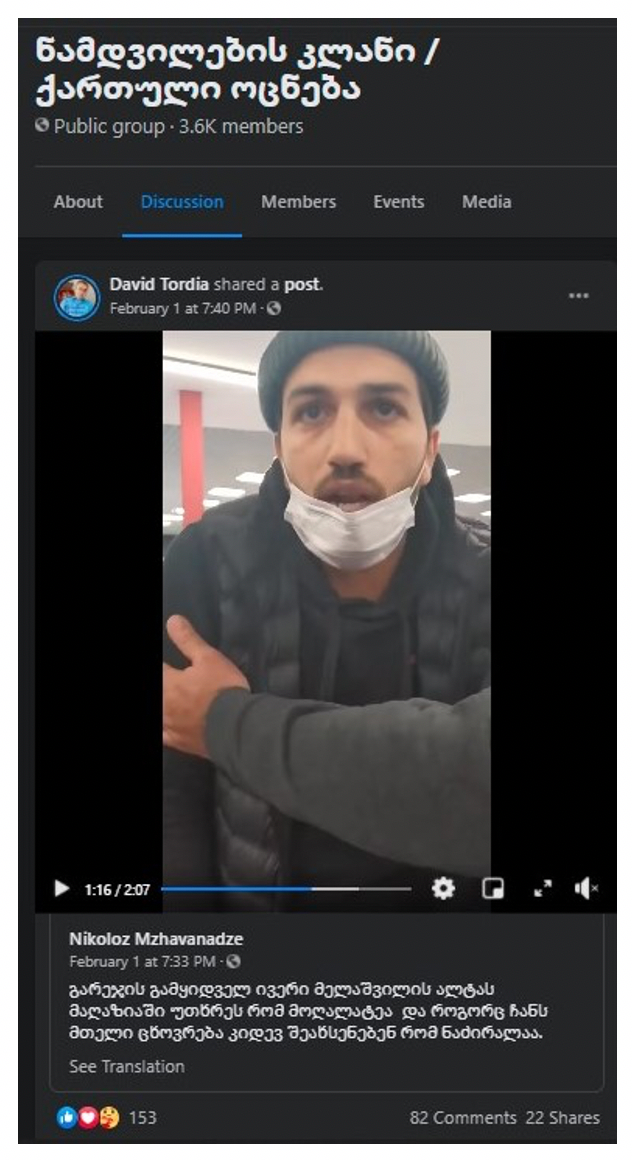
Nikoloz Mzhavanadze, an anchor on TV Obieqtivi, a television channel known for its openly anti-Western and pro-Russian reporting as well as hate speech, also supported the attacker, stating that Melashvili “will be reminded of being of bastard till the end of his life.”
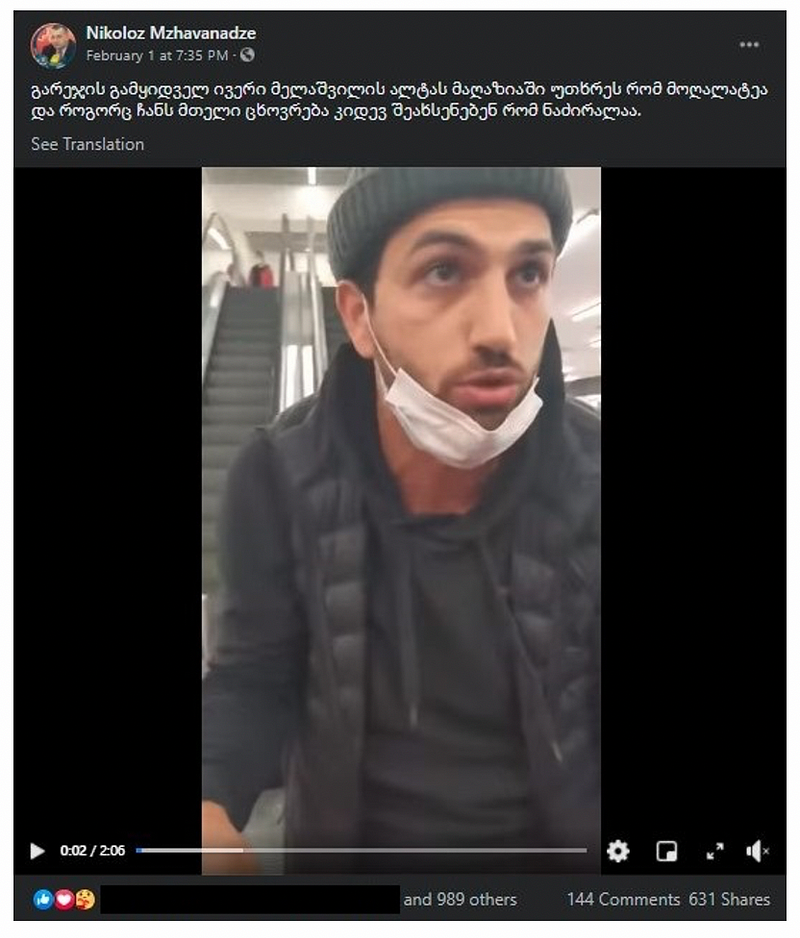
Additionally, the verbal attack on Melashvili was endorsed by Georgian Dream MP Gia Volski and a member of the Georgian clergy. Following the incident, Melashvili himself assessed it as the direct result of government propaganda against him.
Discussions around David Gareji and the role of the two cartographers in the negotiations are still underway in Georgia. The complexity of the topic has resulted in the absence of informed debate, which has helped multiple actors manipulate the issue and promote politically motivated attacks against civil servants such as Melashvili. As the heated confrontation involving Melashvili shows, negative online campaigns can spill into other areas of public life, and can even threaten the safety of those targeted by them.
Sopo Gelava is a Research Associate, Caucasus, with the Digital Forensic Research Lab.
Eto Buziashvili is a Research Associate, Caucasus, with the Digital Forensic Research Lab.
Follow along for more in-depth analysis from our #DigitalSherlocks.

